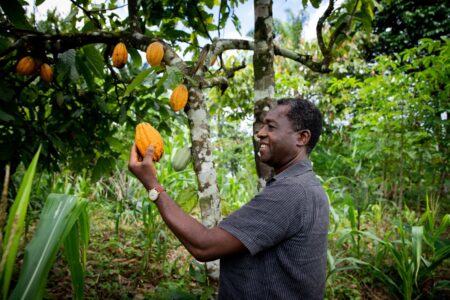Chocoa online conference opens with calls for action on cocoa prices and sustainability collaboration

The opening day of Chocoa’s online Amsterdam Sustainable Cocoa Conference featured a key discussion of the importance of sharing data monitoring of cocoa farming operations for the future viability of the sector, writes Neill Barston.
Against a major backdrop of enhanced scrutiny of the industry in the UN’s designated year of eradicating child labour, the major players within the industry are continuing to intensify their efforts to improve conditions for farming communities in core growing territories including Ghana and Ivory Coast.
An opening session was delivered by Michel Arrion, executive director of the Ivory Coast-based International Cocoa Organisation (ICCO), who asserted his view that in order to create a truly sustainable industry, then considerable focus must be placed on helping raise cocoa prices considerably, to ensure the livelihoods of those at the core of the sector.
Among the speakers for the conference’s ‘Data is King’ session were Suzanne Uittenbogaard (main image), sustainable value chain manager at Cargill, Megan Passey, head of knowledge and learning at the International Cocoa Initiative, Friedel Hutz-Adams, senior researcher at the scientific Sudwind Institut, and Michael Chrisment, CEO of Farmer Connect agricultural data organisation.
Collectively, they acknowledged a need for greater levels of data sharing between companies in order to drive forward sustainability, which brought a number of significant issues to fore including who should actually own data relating to farm management in key territories – with a consensus view seemingly emerging that such potentially sensitive personal information should remain the property of those communities providing it.
Highlighting conditions in West Africa, ICI’s Megan Passey highlighted the fact that 1.56 million children are still exposed to child labour across Ghana and Ivory Coast, which was confirmed by studies published last year by NORC at the University of Chicago, that troublingly discovered that figures had in fact increased by 14% since its last study in 2015.
As she explained, one of the key means of addressing this was through the implementation of child labour monitoring and remediation systems (CLMRS), were key to delivering due diligence policies.
This included a package of proactive measures including raising awareness of the issue through community-based monitors, as well as identifying children at risk through an active monitoring using standardised data sets. This is in addition to providing support to youngsters in child labour through documenting conditions and outlining corrective action to be taken, as well as continuing monitoring to ensure they are not placed in a similar situation again. Encouragingly, she noted that almost 50% of children identified by such systems that it operated had stopped work by the time of their latest follow-up visit.
Critically, she added that from an estimated coverage of 20% of children, industry-wide alignment is required to reach 100% of cocoa households in West Africa.
Speaking to Confectionery Production on the goals of sustainability, Passey said: “We are aiming for sector-wide impact which ultimately depends on sector-wide system coverage. To drive this, companies, governments and other entities are going to have to work together to align their efforts and collaborate.
“This will be greatly aided if they adopt common metrics, share data, and contribute to common reporting frameworks. That will allow us to track and report on progress more uniformly, develop coherent approaches to traceability and ultimately support a collective process of data-driven learning on which continuous improvement and innovation will depend.”

For his part, Friedel Hutz-Adams (above), of Sudwind Institut noted a number issues facing the cocoa sector in terms of sustainability, believing there were potentially ‘huge problems’ facing farmers as a result of a lack of consistently accurate data on the size and scale of farms within the region. He explained that farms were typically on average around 2.5 hectares – which was smaller than some estimates had placed it, meaning making a viable living from cocoa was particularly challenging with an apparent inability for many in the sector to scale up their individual operations.
He noted that there was already a wide range of data that had already been collected by organisations including Ghana’s Cocobod and the ICCO, based in Ivory Coast, so further individual company efforts beyond this may in fact be creating duplication of effort, which he stressed should be avoided.
As for Cargill’s approach on the issue, Suzanne Uittenbogaard added: “When we talk about cocoa supply chain transparency we look at three main elements, this includes understanding where the cocoa that we use comes from (which concerns traceability), understanding the conditions that it has been grown in (impact transparency), and how investments are in difference through the supply chain (financial transparency).

“Data in all of this plays a pivotal role, it’s essential for us to monitoring manage our supply chain, for us to keep on top of our targets for 100% sustainable chocolate and cocoa ingredients. To this end we have been heavily investing in technology and our data systems as a key enabler. In addition, we’ve also launched Cocoawise, a digital suit of tools that aim to provide services at both ends of the supply chain – for farmers, as well as customers.”
She added that there had been a number of other notable initiatives that the company engaged with including a Profarm initiative, focused on professionalising farming operations, which had been focused during the past year to offer specific support in the West African region in handling the impact of coronavirus on the farming sector. Linked to this is a scheme known as ProCo-op, which instead of providing tools has helped farmers in terms of financial management.
Uittenbogaard believed these collective measures, including additional one-to-one farmer coaching session, were significant steps in improving traceability of cocoa operations that formed a core element of providing long-term sustainability within the sector.
Significantly, she said that the data gathered from such initiatives was being placed towards enabling development of more cost-effective child labour monitoring systems, which she felt was of significant importance.
ICCO call for action on prices

As Michel Arrion explained to Confectionery Production, the broader issue of sustainability across the cocoa industry is an issue that requires considerable collective focus.
With the present covid pandemic impacting on prices of cocoa in particular, he believed that asserting higher values for cocoa remained of key importance for the industry’s future prosperity.
This is underlined that the present price of cocoa at around £1,800 a tonne compared to the historic peak rates of around £3000 per tonne at the end of the 1970s and early 80s.
Speaking to Confectionery Production, Arrion said: “Higher Prices in London and New York will give a room of manœuvre to the countries of origin to increase farm gate prices, and to pay the farmers better.
“In order to have an impact on the international prices, we need to work on the 2 sides of the market equilibrium equation: the supply side is to be managed in a coordinated fashion (supply management) and stabilised at a certain level, matching the industrial demand of the grinders, without surpluses: the demand side is to be boosted (generic promotion of consumption).
“The aim of the producing countries to get “a bigger share of the cake” should be reformulated as aiming to have “a bigger cake” first; to give room to an increased added value and share it among all stakeholders who would all get more in absolute terms. The EU talks with Ghana and Côte d’Ivoire are very interesting and show the way to go at bilateral level.”
He added that the ICCO also had a mandate for improving its own operations in terms of engaging with a broader range of countries in its efforts to play an active role in delivering sustainability for the cocoa industry.



